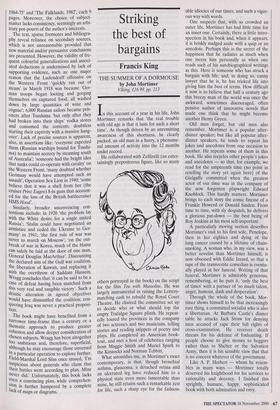Striking the best of bargains
Francis King
THE SUMMER OF A DORMOUSE by John Mortimer Viking, £16.99, pp. 213 In this account of a year in his life, John Mortimer remarks that 'the real trouble with old age is that it lasts for such a short time'. As though driven by an unremitting awareness of this shortness, he clearly packed, an old man in a hurry, a phenome- nal amount of activity into the 12 months under record.
He collaborated with Zeffirelli (an enter- tainingly preposterous figure, like so many others portrayed in the book) on the script for the film Tea with Mussolini. He was largely instrumental in raising the Lottery- matching cash to rebuild the Royal Court Theatre. He chaired the committee set up to decide who or what should top the empty Trafalgar Square plinth. He repeat- edly toured the provinces in the company of two actresses and two musicians, telling stories and reading snippets of poetry and plays. He completed an American book- tour, and met a host of celebrities ranging from Maggie Smith and Muriel Spark to the Kinnocks and Norman Tebbitt.
What astonishes me, as Mortimer's exact contemporary, is that, though bronchial asthma, glaucoma, a detached retina and an ulcerated leg have reduced him to a physical state even more lamentable than mine, he still retains such a remarkable zest for life, such a sharp eye for the fashion- able idiocies of our times, and such a vigor- ous way with words.
One suspects that, with so crowded an outer life, Mortimer has had little time for an inner one. Certainly, there is little intro- spection in his book and, when it appears, it is briskly nudged aside with a quip or an anecdote. Perhaps this is the secret of the happiness that he radiates as much when one meets him personally as when one reads such of his autobiographical writings as this. Here is someone who has struck a bargain with life; and, in doing so, canny lawyer that he is, he has tricked life into giving him the best of terms. How difficult it now is to believe that half a century ago this breezy man of the world was once the awkward, sometimes discouraged, often pensive author of innovative novels that made one think that he might become another Henry Green.
Old men forget, but old men also remember. Mortimer is a popular after- dinner speaker; but like all popular after- dinner speakers, he tends to repeat his jokes and anecdotes from one occasion to another. He repeats some of them in this book. He also recycles other people's jokes and anecdotes — so that, for example, we read for the umpteenth time (no point in retelling the story yet again here) of the Gielgaffe committed when the greatest actor of our time was in the company of the now forgotten playwright Edward Knoblock. This hardly matters. Mortimer brings to each story the comic finesse of a Frankie Howerd or Donald Sinden. From time to time, with sly despatch, he delivers a glorious put-down — the best being of Roy Jenkins at his most self-important.
A particularly moving section describes Mortimer's visit to his first wife, Penelope, then in her eighties and dying of the lung cancer caused by a lifetime of chain- smoking. A woman who, in my view, was a better novelist than Mortimer himself, is now obsessed with Eddie Izzard, so that a tape of the transvestite comedian is eventu- ally played at her funeral. Writing of that funeral, Mortimer is admirably generous, remembering, as he puts it, 'only the best of times' with a partner of 'so much talent, anger, humour, dash and desperation'.
Through the whole of the book, Mor- timer shows himself to be that increasingly rare thing, a committed socialist who is also a libertarian. At Barbara Castle's dinner table he attacks Jack Straw for denying men accused of rape their full rights of cross-examination. He receives death threats for his defence of foxhunting. If people choose to give money to beggars rather than to Shelter or the Salvation Army, then it is his sensible view that that is no concern whatever of the government.
Like A. P. Herbert — whom he resem- bles in many ways — Mortimer totally deserved his knighthood for his services to rationality and decency. I finished this sprightly, humane, happy, sophisticated book with both admiration and envy.


































































































 Previous page
Previous page